

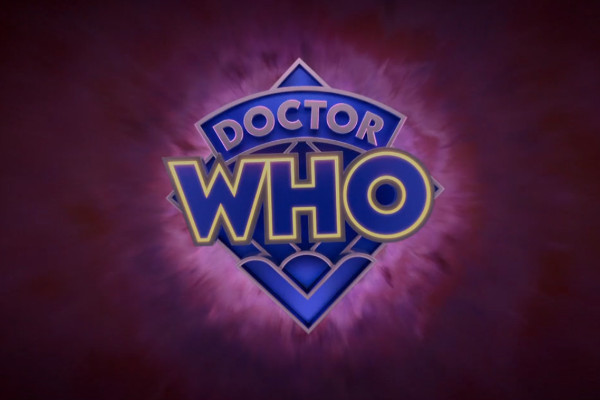
The specials are available on DVD and BluRay from Amazon. In the meantime, please join me as we take a look at these specials, and rank them from worst to best...
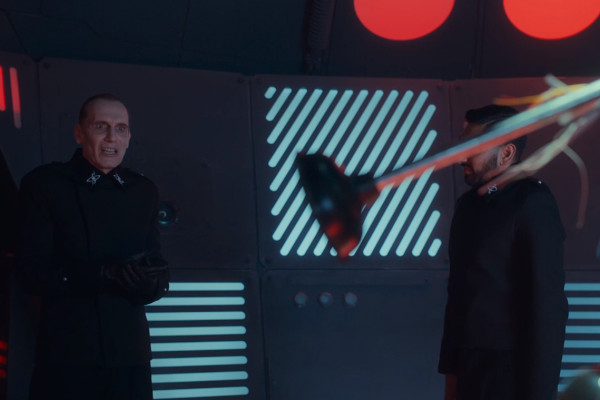
New Who isn't highly regarded here at the Anorak Zone, and often it's a mistake to engage in any discourse about it at all. A person's entire character, beliefs and political leanings can, in a bizarre world we now call "reality", be decided upon by your opinion of what is essentially a daft kid's show. Or, to put it another way, if you don't like New Who, you can be branded a Tory. It's often best to regard New Who as essentially a fan fiction version of the original series, as separating what are, in essence, two very different series, makes it all a bit more palatable.
Out of the New Who Doctors, then Peter Capaldi is obviously the most "on model" by the standards of the old series, but David Tennant is undeniably the most popular with the public. The idea of a shagger Doctor going around the universe as a Timmy Mallett tribute act isn't one that gives me a great deal of personal pleasure, but I can see how it appeals to the public.
It also, of course, brings in a demographic that was never there in the past. The Doctor in the old series wasn't about being "sexy", and it was very much a "boys only" show. With Tennant's initial run, and, crucially, Tennant's return, he's tapped into a wider audience that flock to the series. And while sexualising the Doctor is a somewhat strange way to reconfigure the show, those of us with long memories will recall how you'd never admit to being a fan of Doctor Who during the mid-late 80s. In fact, so uncool was Doctor Who back then, you'd tell people you were sleeping with your gran rather than watching McCoy, just to save face.
So, what we have here is a 5 minute scene for Children In Need, where the Daleks get given a sink plunger. Such "it's just a laugh" moments don't really work when the entire series is so fond of meta commentary and "Yes, we know it's silly, too" moments... put this in something like the early Pertwee era, and it'd work as a gag. Put it in New Who and it's hard to tell if it's a regular episode or not. It goes far in terms of the parody, but not all that much further than Matt Smith impersonating the noise of the TARDIS, Missy likening the spheres of the Daleks to testicles, or insisting that the lead character's name really is 'Doctor Who'.
After the skit aired, a No One Calls It X (Formerly known as Twatter) storm erupted over comments that Russell T Davies made over Davros being reconfigured as a man who could walk. It scarcely makes a difference here, as it's a "comedy" skit, but this is, so it seems, the way Davros will be depicted going forward. And it's an interesting debate.
Apart from the fact that Davros is essentially half Dalek, so they're "made in his image" (pretty much the entire point), the trope of "evil disabled people" is a valid criticism, something that's been touched upon on this site in the James Bond movie article. Phasing such things out is an answer to this issue, but completely changing an existing character isn't. In fact, the most obvious solution seems to have eluded the production team: if you've got an old character that you think can't be brought back without having to be changed to suit modern societal mores, then.... don't bring them back in the first place.
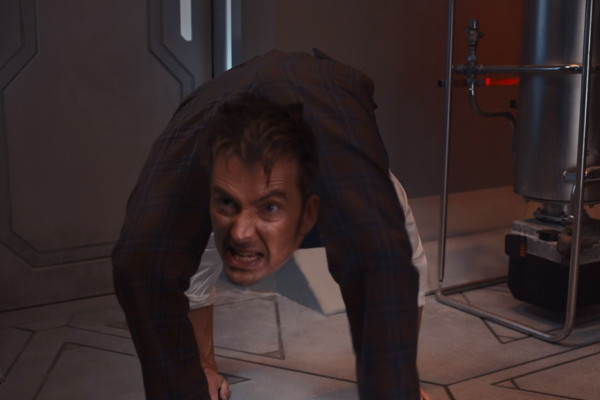
See, some people would cruelly take the above screenshot out of context for a cheap, snide gag, and go "I see Tennant's up his own arse again". But such remarks won't be written here.
Russell T Davies is a decent writer in "real life" stuff, but most of his sci-fi ideas seem to be either cobbled together clichés or unimaginative stuff like "aliens... but with an animal's head". We don't get any bipedal cats/flies/rhinos in this one, but we do get standard sci-horror tropes seen multiple times before. The idea of what is essentially a horror film aboard a deserted spaceship isn't a bad one, though probably too scary for kids.
At least, it would have been if the CGI didn't get more laughable the longer it went on. And while I don't have a particular issue with Tate the way many seem to, the limitations of her range are more than flagged up by her dual role as an evil doppelgänger. Tennant's scenery-eating version of the Doctor has its moments, but he, too, goes too far to make this anything seriously compelling.
Finally, we have to talk about it, it seems: an Isaac Newton of half-Asian descent. This was something already appearing in the Steven Moffat era, with Moffat quoted by the BBC in 2016 as saying: "We've kind of got to tell a lie. We'll go back into history and there will be black people where, historically, there wouldn't have been, and we won't dwell on that. We'll say, 'To hell with it, this is the imaginary, better version of the world. By believing in it, we'll summon it forth."
It's strange to hear someone describing an immutable fact as a "better version". And it's symptomatic of the "anything goes", "he can fly in a blue box, so why shouldn't [X] also be allowed to happen?" mentality towards New Who that we get a situation like this. The idea of race-changing an actual historical figure in a show for kids is, of course, a fundamentally stupid idea. Maybe not stupid by New Who's "whatever" mentality, but stupid from the perspective of the sixty years this special was celebrating, where the Hartnell era began with a somewhat Reithian outset to educate as well as entertain. No school age child particularly watched Doctor Who to learn factual history, but that option is gone, with the Doctor now travelling through a distorted reimagining of the past.
These things are, you may think, quite obvious. Almost so obvious that they not only go without saying, but that they can be discussed without any political allegiance being assumed. Yet, at least in the crazy world of Twatter, this isn't the case. Within minutes of the episode ending, someone was tweeting about how the "black" (their words) Isaac Newton won't "harm anyone". Thereby completely missing the point in the most spectacular way.
I replied to them, stating the fairly obvious: "Isaac Newton wasn't of Asian descent. You know that, right?". My tweet that evening got a like from someone with the hashtag "Right Wing" in their profile, while less than a day later there were multiple tweets from people claiming those who disagreed with the casting decision were, and I quote, "racists". Such is the state of the world today, or at least the world through a Twatter lens. It's insanity.
There will be those who say it's just a small scene, a couple of minutes at most, so what does it matter? And it's a fair point. I'm hardly foaming at the mouth here, it's just more of a discussion point than most of the episode. But if it's of so little consequence, then... why do it at all?
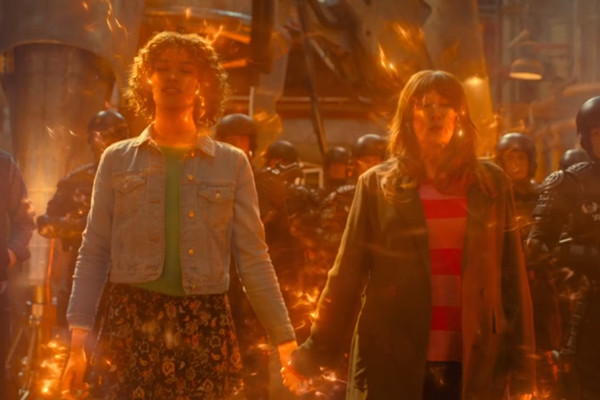
The Star Beast is a relatively harmless reworking of an old comic strip, featuring dialogue that's a mix of exposition, things that people would actually say, and things that people wouldn't actually say. The self-aggrandising scenes as someone reminds us that a companion is the otter's star bark of the universe or that the Doctor is the clitoral hood of Irene Handl in a packet of prawn cocktail crisps is nonsensical "tell not show", and does take a lot of getting used to. But it's... okay.
However, this episode also caused a mass Twatter storm and much division due to the inclusion of a trans character. This has led to some quite shocking extreme views, which is particularly odd as New Who has always been overtly progressive. But while some want to say "woke" as a pejorative and talk about never watching again, and another group are talking about how wonderful it is, what about that little-heard third group... the group who don't have an issue with the inclusivity, but merely want to wet themselves laughing over how jarringly written it all is?
Here we get a plot resolution because a character is non-binary. The message isn't the object of derision, the delivery is. There's a Jon Pertwee story with a subtext of population overcrowding where he sits down in a room to watch a documentary about high rise buildings - and it's still more subtle than this. Not only is the revelation of Rose Noble completely "on the nose", but it also might be confusing to people who don't know much about trans issues and wonder how someone can be trans and non-binary... the kind of people like Donna's mum, who are a different generation and "don't get it", and need to be helped.
It's a shame, because a lot of the content about Rose before that point is quite nicely done. But like pretty much all of New Who, the writer's hand is too clearly felt in the story. Any drama needs to maintain a level of artifice in order to get people involved, as soon as the fiction of the situation is flagged up too heavily, it all begins to fall apart. Unless, it seems, you're a fan of this New Who stuff, where the total lack of genuine peril is a regular feature of the show. That, and cracked roads that can seal themselves back up again.
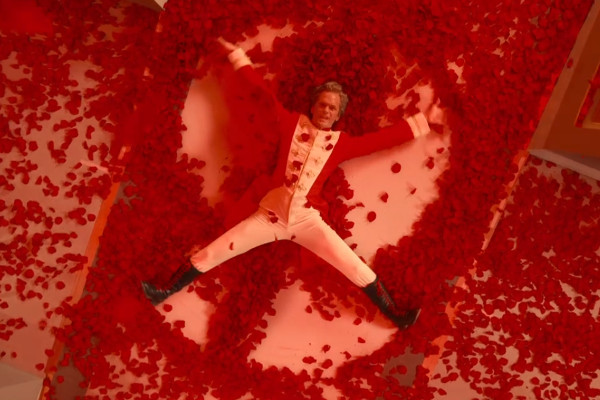
Doctor Who's falling ratings over the last few years have often been brought up, but are also largely irrelevant. When even perennials like Coronation Street can barely scrape together five million viewers in the current climate, we have to realise that a lot less people watch TV these days, and the only real indication of how popular something is, comparatively speaking, comes with the chart position.
As one example, Jodie Whitaker was accused of falling ratings, but this doesn't quite bear out. Her second series from 2020 had an average of 5.4 million viewers, while her third in 2021 dropped to just under 5 million. Yet the latter run was, on average, the 17th most-watched programme on television, the higher-rated run just 25th. The point is, ratings can fall, but proportionately with the rest of television around it. (Let's not get into the fact that her first series was much more popular and averaged at 10th place and 7.96 million, as that's another story and not the point being made here.)
The three Tennant specials averaged 7.2 million viewers, with this edition watched by 6.8 million. There was a slight dip across the three episodes (757,000 less people were watching this episode than watched The Star Beast) but this can be passed off as the "first night" push, and the chart placing held, averaging at 10th place. There are those that like to use these ratings to point to the series not enticing the public as much, given that David Tennant's first "leaving" episode was watched by the best part of 12 million, but back then 6.8 million would have seen the show ranked at 20th place in the charts, not 10th, and the highest-rated show the week The Giggle aired - the Strictly Come Dancing final - wouldn't have made the Top 10 of January 2010. Times have definitely changed.
This episode and The Star Beast both have commentary tracks on the BBC iPlayer, while all four specials have a behind-the-scenes Unleashed feature to go with them. On the commentary you can hear not just RTD and producer Phil Collinson have fannish knowledge of the show, but Tennant, too. And while it's nice to pay fan service, it goes far beyond the "fanwank" of the '80s and into whole new areas.
So we get the unlikely sight of the return of Mel Bush, mistakenly believing herself to have been the first ginger companion. In fairness, the reintroduction of Mel is made more palatable by Bonnie Langford appearing in over 340 episodes of EastEnders, so giving her a fresh lease of life in television, rather than other companions who are picked from obscurity since they finished the show. Plus, it's Bonnie Langford. Bonnie gives her best performance in the role, which the crueller might say isn't a high bar, though the fannish mentality went so far that she had lines referring to Time and the Rani which were cut.
RTD's twin obsessions with lowbrow, mainstream culture and challenging Who's heteronormativity come to the fore with a being from outside existence who comes to Earth to lipsynch to the Spice Girls... and then wants to stay because he likes Tetris. The fundamental lack of imagination from RTD beyond "stuff he knows himself" and "stuff that's happened before in Doctor Who, reheated and mixed up" sees the Toymaker's games fall flat as they revolve around a card draw and playing a game of catch.
The Unleashed special reveals why the Toymaker puts on dodgy European accents and makes a sly racist remark at the start of the show: The Toymaker is a bit racist, basically. Even though he's from beyond our universe where the concept of "race" should be beneath him, he has to be, because he "culturally appropriated" back in the 1960s. Bloody Hell.
New Who has frequently had "own goals" in misguided attempts at progression and diversity. For example, the first time the Doctor got a black companion, he stole his girlfriend and paired him off with another black companion he'd rejected. ("There you are, Mickey, stick with your own kind while my clone has go on your missus - ALONZEEEEEEEEEEEEEEEE!") Still, the Toymaker's return is a treat for all those millions of viewers who were waiting 57 years for him to come back.
Despite all this, it's the best of the specials by a fair margin... which, again, isn't a particularly high bar. The various revelations and canon-twisting events didn't really have much of an impact here at The Anorak Zone as they've been widely leaked for over two months before the episode aired, but it remains to be seen what mainstream viewers would make of it all.
If you'd like to treat me to a coffee for braving this look at New Who, then the button is below, but if you don't, that's fine too. It's been... an experience.